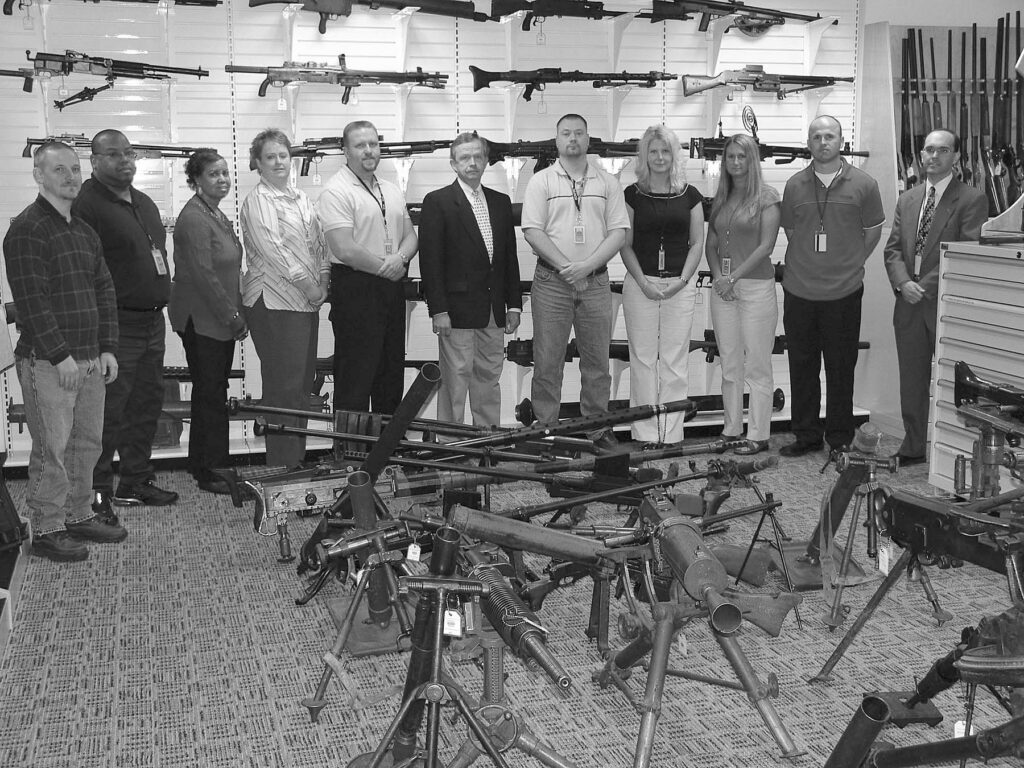By John Brown
During the last several weeks we have been planning our first of a series of trips to ATF to visit the NFA Branch and the Firearms Technology Branch (FTB); both located in Martinsburg, West Virginia. I was amazed to find that the facility, only a two hour drive from Washington D.C., was an easy trip and an enjoyable drive. Still a long commute for any Branch employees who may still live in the DC area.
Getting inside the facility required special permission and there was no doubt in anyone’s mind that this facility is especially sensitive to security measures. At every turn we were met by ATF security personnel in a professional and welcome fashion. The building offers many of the amenities you find in office buildings everywhere with the exception of one major thing: everyone was extremely friendly. I pinched myself and reminded everyone that this is West Virginia, not D.C., and that the State expression, “Almost Heaven” could be felt by everyone we met. I knew this pleasant attitude already existed with the examiners but the friendly atmosphere in that facility went way beyond the personnel that most of our community has the opportunity to deal with in the past. Everyone was a pleasure to be around.
We started our morning with a tour of the Firearms Technology Branch, hosted by Chief of the Branch Sterling Nixon and Assistant Branch Chief FTB, Rick Vasquez. We learned the different aspects of the Technology Branch and the many issues that they address in their work. Surprisingly, approving new designs make up a very small portion of what they are responsible for. Included in their pallet of tools are not only labs for firearms identification and assessment but a live indoor range for weapons testing. The depth and the knowledge of the staff was impressive and again extremely friendly.

The surprise that followed our meeting with the Technology Branch was a tour of the new Martinsburg vault. Firearms Technology Branch (FTB) has access to virtually every NFA weapon ever imported, manufactured, or designed from countries all over the world. The brief stay in the vault was enough to make the most spirited collector lapse into a semi comatose state. I was glad for the opportunity to know that the agency has such a prolific reference library of weapons to work with in their endeavors.
After leaving FTB we were escorted to a conference room where we met with all of the members of the NFA staff and the Chief of NFA Branch, Ken Houchens. NFA Branch is responsible for the National Firearms Registration and Transfer Registry (NFRTR) data pool, as well as processing all types of forms that we use in the NFA community. We focused on introducing ourselves and what the NFATCA was all about and quickly turned the meeting over to the examiners with our first question.
“If you had the Class 3 dealers here in front of you today and you had 30 minutes to tell them what frustrates you the most about processing their paperwork, what would you say to them?”
The discussion that ensued would fill the space of the entire magazine and the examiners had good advice for both the industry with government transfers and the collector community. The NFATCA will detail and summarize that discussion in the next issue. In the lengthy discussion that followed the meeting with the examiners we decided that a separate article that details how we in the NFA community could help the refreshingly fast transfer process get even better. There are many ways we can easily help a process that has been totally overhauled in the last eight months. You’ll not want to miss that article. It will change your life in terms of how you handle transfers in the future.
One example of what they shared with us was regarding incomplete Form 4s being sent in. The examiners all stated that this was one of the top time wasters for getting transfer times sped up. The NFATCA has suggested to its members before that experienced dealers should always control the transfers to their customers, ensuring all paperwork is correct before it goes to DC, but unfortunately inexperienced people seem to be giving “Internet Advice” to the contrary, saying that the individual should insist on sending his own Form 4 in. We could all benefit from more efficiency if this system of checks done by dealers were followed.
At the conclusion of that meeting we had the pleasure of having the entire team meet in the vault where we captured a picture of the team. We took this opportunity to thank everyone who contributed to a very educational day and time with ATF. The visit is the first in series of events where we will begin working closely together on a number of issues, all of which we will try and address in the NFATCA articles. The entire staff at Martinsburg should be commended by everyone that has the opportunity to deal with them. They are a wonderful staff and I think I can say for our community that they are doing one heck of a job. Thank You!
| This article first appeared in Small Arms Review V9N12 (September 2006) |











